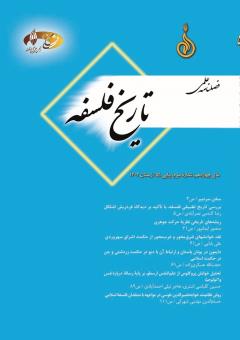بررسی تاریخ تطبیقی فلسفه با تأکید بر دیدگاه فردریش اشلگل
محورهای موضوعی : ریشهشناسی مکاتب و آراء فلسفی در ادوار قدیم و جدید
1 - دانشیار گروه فلسفه، دانشگاه تهران، پردیس فارابی، قم، ایران
کلید واژه: تاریخ تطبیقی فلسفه, فلسفة تطبیقی, گونهشناسی, اشلگل, ماسونـاورسل.,
چکیده مقاله :
یکی از رویکردها در فلسفة تطبیقی، مقایسۀ مبتنی بر طبقهبندی نظامهای فلسفی است که پیشینۀ آن به ارسطو میرسد. در دهۀ نخست سدۀ نوزدهم، ژراندو و اشلگل این قسم از فلسفة تطبیقی را با تمرکز بر گونهشناسی نظامهای فلسفی و تحلیل تطبیقی آنها، با عنوان تاریخ تطبیقی فلسفه، مطرح کردند. گونهشناسی زمینۀ رهایی اندیشمند از محدودیتهای یک نظام فلسفی را فراهم میسازد و او را در موقعیت ارزیابی مشارکتهای مختلف فیلسوفان دیگر قرار میدهد. تاریخ تطبیقی فلسفه بر این اصل استوار است که برای تعیین جایگاه و سهم یک فیلسوف در تاریخ فلسفه، نباید استدلالهای معتبر و درست او مبنای داوری قرار داد، بلکه باید مشارکت وی در تاریخ فلسفه با مشارکت و نقش فیلسوفان دورهها و سنتهای فلسفی مختلف مقایسه گردد. بنابرین، هدف تاریخ تطبیقی فلسفه، برشمردن نظامهای فلسفی بترتیب تاریخی نیست، بلکه مقصود نقد همۀ فلسفههای پیشین و بیان رابطۀ آنها با یکدیگر است. بر این اساس، چگونگی پیدایش یک نظام فلسفی از دل یک گونۀ دیگر و بسط و زوال آن، در تحلیل تطبیقی مورد توجه قرار میگیرد. تاریخ تطبیقی فلسفه بجای تکیه بر اصول پیشینی، پیامدها و تأثیرات عملی فلسفههای مختلف در قلمرو علم، هنر و حکومت را مبنای ارزیابی قرار میدهد. در این مقاله، ضمن بررسی رویکرد میانفرهنگی فردریش اشلگل به تاریخ تطبیقی فلسفه، شباهتهـا و تفاوتهـای آن با فلسفـة تطبیقـی بمعنای جدیـد کلمـه (دیـدگاه ماسونـاورسل) و تاریخ تطبیقی فلسفۀ جهان (با تمرکز بر کتابی با همین عنوان از شارفشتاین) بررسی خواهد شد.
One of the approaches in comparative philosophy is comparison based on the classification of philosophical systems, which dates back to Aristotle’s time. In the first decade of the 19th century, Gérando and Schlegel introduced this kind of comparative philosophy with a focus on the typology of philosophical systems and their comparative analysis under the title of comparative history of philosophy. Typology allows thinkers to free themselves from the limitations of a specific philosophical system and grants them the opportunity to evaluate the contributions of various philosophers. The comparative history of philosophy is based on the principle that, in order to determine the place and share of each philosopher in the history of philosophy, one cannot judge them based on their valid and correct arguments. Rather, their contributions in the history of philosophy must be compared with the contributions and roles of other philosophers in various periods and philosophical schools and traditions. Therefore, the purpose of the comparative history of philosophy is not to provide a chronological list of different philosophical systems; rather, it aims to review all earlier schools of philosophy and explain the relationships among them. Accordingly, the quality of the emergence of a philosophical system from the core of another one and its extension and annihilation are investigated in a process of comparative analysis. Instead of relying on earlier principles, the comparative history of philosophy considers the outcomes and practical effects of various philosophies in the realms of science, art, and government as the basis for evaluation. In this paper, while exploring Schlegel’s intercultural approach to the comparative history of philosophy, its similarities to and differences from comparative philosophy in its new sense (Paul Masson-Oursel’s view) and the comparative history of world philosophy (with an emphasis on Sharfstein’s A Comparative History of World Philosophy) will be examined.
ارسطو (1385) متافیزیک، ترجمۀ شرفالدین خراسانی، تهران: حکمت.
Gilson, E. (1950). The unity of philosophical experience. New York: Charles Scribner'S Sons.
Gilson, E. (1952). Being and Some Philosophers. Toronto: Pontifical Institute of Mediaeval Studies.
Halbfass, W. (1988). India and Europe: An essay in understanding. Delhi: Motilal Banaridass Publishers.
Hegel, G. W. F. (2009). Lectures on the History of Philosophy. vol. 1. trans. by R. F. Brown & J. M. Stewart. Oxford University Press.
Masson-Oursel, P. (1926). Comparative philosophy. trans. by V. C. C. Collum. London.
Millan-Zaibert, E. (2007). Friedrich Schlegel and the emergence of Romantic philosophy. State University of New York Press.
Neville, R. C. (2001). Two forms of Comparative Philosophy. Dao: A Journal of Comparative Philosophy. vol. 1, No. 1, pp. 1-13.
Neville, R. C. (2008). Ritual and Deference: extending Chinese Philosophy in a comparative context. State University of New York Press.
Park, P. K. J. (2013). Africa, Asia, and the History of Philosophy: Racism in the Formation of the philosophical canon, 1780–1830. Albany: State University of New York Press.
Scharfstein, B. A. (1998). A comparative history of philosophy: from the Upanishads to Kant. University of New York Press.
Wolfson, H. A. (1982). Philo: Foundations of Religious Philosophy in Judaism, Christianity, and Islam. 5th ed. Harvard University Press.


